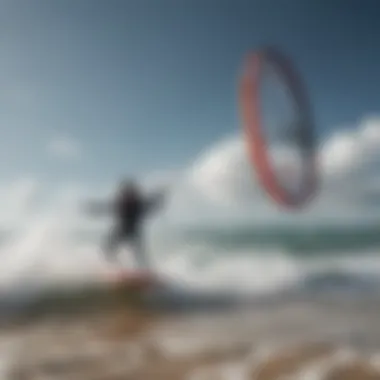Unlocking the Potential of Weather Flow with Advanced Weather Meter Technology


Equipment Reviews
When discussing the maximization of weather flow in kitesurfing and kiteboarding, it is crucial to consider the equipment's role in enhancing performance. Kites play a pivotal role in harnessing wind power, with varying shapes, sizes, materials, and brands catering to different riding styles and conditions. Understanding the nuances of kite design is essential for optimizing control and maneuverability on the water.
Moving onto boards, riders are presented with a diverse array of options, including twintips and directional boards, each offering distinct advantages based on design, construction, and suitability for specific riding styles. Analyzing these features is paramount for selecting a board that complements individual skill levels and objectives.
In addition to kites and boards, accessory selection significantly impacts the overall kitesurfing experience. Items like harnesses, lines, pumps, and safety gear are indispensable for safety and efficiency on the water. Delving into the importance of each accessory, riders can tailor their gear setup to align with their performance goals and environmental conditions.
Weather Flow for Kitesurfing and Kiteboarding
This section explores the critical importance of weather flow for kitesurfing and kiteboarding in enhancing the overall experience on the water. Weather flow is the backbone of these extreme sports, dictating wind conditions crucial for propulsion. Understanding weather flow not only ensures safety but also maximizes performance and maneuvers on the water. By delving into wind patterns and utilizing the latest weather meter technology, enthusiasts can harness optimal wind conditions for an exhilarating ride.
The Fundamentals of Weather Flow
Why Weather Flow Matters
Weather flow matters significantly as it directly impacts the riding experience. By comprehending weather patterns, riders can anticipate gusts and shifts in wind, optimizing their movements and speeds. The ability to read weather flow enables athletes to engage in advanced techniques and tricks safely, pushing the boundaries of their skills. Mastering weather flow is akin to mastering the elements, giving riders a competitive edge and enhancing their overall performance on the water.
Impact of Weather Conditions on Riding
The impact of weather conditions on riding is profound, shaping the entire kitesurfing or kiteboarding session. Wind strength, direction, and consistency influence the feasibility of certain maneuvers and tricks. Riders must adapt their strategies based on prevailing weather conditions to ensure a smooth and dynamic ride. Weather conditions not only affect individual performance but also play a crucial role in overall safety while engaging in these adrenaline-pumping sports.


Analyzing Wind Patterns
Understanding Local Wind Systems
Understanding local wind systems is crucial for optimizing riding experiences. Different geographical locations exhibit unique wind behaviors that riders must grasp to leverage wind patterns effectively. By analyzing how local topography interacts with wind currents, athletes can predict wind shifts and velocities accurately, enhancing their performance on the water.
Identifying Ideal Wind Directions
Identifying ideal wind directions is key to maximizing the kitesurfing or kiteboarding experience. Certain wind angles and directions complement specific maneuvers, enabling riders to execute tricks with precision and style. By recognizing favorable wind directions, athletes can plan their sessions strategically, capitalizing on optimal conditions for a challenging and rewarding ride.
Harnessing Wind Power Effectively
Utilizing Wind Gusts for Tricks
Utilizing wind gusts for tricks is a skill that elevates a rider's performance to new heights. Wind gusts provide impetus for executing high-flying jumps and spins, adding flair and excitement to every session. Riders who can harness wind gusts effectively can showcase an extended repertoire of tricks, captivating audiences and pushing the boundaries of kitesurfing and kiteboarding.
Optimizing Speed in Tailwinds
Optimizing speed in tailwinds is a strategic approach to maximize propulsion and maneuverability. Tailwinds can boost a rider's speed significantly, allowing for swift transitions between tricks and turns. By mastering the art of riding in tailwinds, athletes can achieve seamless flow in their movements, enhancing the overall fluidity and grace of their performance on the water.
The Role of Weather Meters in Enhancing Performance
Weather meters play a pivotal role in optimizing performance for kitesurfing and kiteboarding enthusiasts. These cutting-edge devices provide crucial insights into weather conditions, allowing riders to make informed decisions for a safer and more efficient experience on the water. By harnessing real-time data, riders can adapt their strategies, adjust their riding techniques, and maximize their overall performance based on accurate meteorological information. Weather meters act as indispensable tools for enthusiasts seeking to elevate their skills and enhance their enjoyment of the sport.


Introduction to Weather Meter Technology
Features and Functions of Modern Weather Meters
Modern weather meters boast a wide array of features and functions designed to meet the specific needs of kitesurfers and kiteboarders. These advanced devices are equipped with capabilities such as wind speed measurement, wind direction analysis, temperature monitoring, and barometric pressure sensing. The key characteristic of modern weather meters lies in their precision and accuracy, providing riders with reliable data to inform their on-water decisions. With the ability to capture real-time meteorological parameters, these devices empower enthusiasts to optimize their riding experience and ensure superior performance.
Benefits of Real-Time Data Monitoring
Real-time data monitoring offered by weather meters is instrumental in enhancing the performance of kitesurfing and kiteboarding activities. By tracking and analyzing critical weather metrics as they unfold, riders can make immediate adjustments to their riding techniques, capitalize on favorable wind conditions, and avoid hazardous weather situations. The primary advantage of real-time data monitoring is its ability to offer up-to-the-minute insights, allowing riders to stay ahead of changing weather patterns and optimize their performance accordingly. While the unique feature of real-time data monitoring is its rapid response capabilities, its main disadvantage may lie in the reliance on continuous monitoring for effective decision-making.
Choosing the Right Weather Meter
Factors to Consider in Selecting a Weather Meter
When selecting a weather meter for kitesurfing or kiteboarding, several key factors must be taken into account. These include the device's accuracy, durability, portability, ease of use, data display options, and battery life. Ensuring that the chosen weather meter aligns with the user's requirements and preferences is essential for maximizing its utility in enhancing performance on the water. The unique feature of selecting the right weather meter lies in its personalized fit for individual riders, offering a tailored solution to meet their specific needs and objectives.
Top-rated Weather Meter Models in the Market
The market offers a diverse range of top-rated weather meter models renowned for their quality and performance. These models often come equipped with advanced features such as Bluetooth connectivity, data logging capabilities, weather trend indicators, and smartphone compatibility. The key characteristic of these top-rated models is their comprehensive functionality combined with user-friendly interfaces, making them popular choices among kitesurfing and kiteboarding enthusiasts. While the unique feature of these models lies in their technological sophistication, potential disadvantages may include higher costs and complex operational procedures.
Utilizing Weather Meter Readings for Performance Optimization
Interpreting Wind Speed and Direction Data


Interpreting wind speed and direction data is essential for optimizing performance in kitesurfing and kiteboarding. By analyzing these key metrics provided by weather meters, riders can gauge the ideal conditions for different maneuvers, adjust their sailing angles for maximum efficiency, and anticipate wind gusts or lulls during their sessions. The primary advantage of interpreting wind speed and direction data is the ability to fine-tune riding techniques based on precise meteorological information.
Adjusting Riding Techniques Based on Weather Metrics
Adapting riding techniques based on weather metrics is crucial for optimizing performance and ensuring safety on the water. Weather meters offer valuable insights into changing weather conditions, enabling riders to modify their strategies, speeds, and maneuvers accordingly. The key characteristic of adjusting riding techniques based on weather metrics is the ability to enhance control, agility, and responsiveness in varying wind conditions. While the unique feature of this approach lies in its adaptability to real-time weather data, potential drawbacks may include the need for continuous monitoring and quick decision-making during riding sessions.
Integration of Weather Flow and Weather Meter Insights
In this section, we delve deep into the critical aspect of integrating weather flow and weather meter insights for kitesurfing and kiteboarding enthusiasts. By combining the understanding of wind patterns with the latest technological advancements in weather meters, riders can elevate their performance to new levels. The integration of weather flow and weather meter insights allows athletes to make informed decisions based on real-time data, leading to more productive and safe riding sessions. By harnessing the power of technology, riders can maximize their time on the water.
Maximizing Riding Sessions with Data-driven Approaches
Planning Sessions According to Weather Predictions
Planning sessions according to weather predictions is a cornerstone of optimizing kitesurfing and kiteboarding experiences. By carefully analyzing weather forecasts, riders can choose the most suitable timing for their sessions, aligning the wind conditions with their skill level and objectives. This data-driven approach minimizes the risk of being caught in unfavorable weather and enhances the overall efficiency of riding sessions. Adhering to weather predictions ensures that riders make the most out of their time on the water, progressing steadily in their abilities.
Adapting Strategies in Response to Changing Conditions
Adapting strategies in response to changing conditions is crucial for maximizing performance in dynamic environments. The ability to adjust one's approach based on sudden shifts in wind speed or direction can significantly impact the outcome of a riding session. By remaining flexible and responsive to the ever-changing weather patterns, athletes can maneuver through challenges with ease, maintaining a high level of control and safety. This adaptive strategy not only enhances the thrill of the sport but also hones riders' resilience and adaptability skills, essential for mastering kitesurfing and kiteboarding.
Achieving Peak Performance through Meteorological Awareness
Enhancing Safety Measures with Weather Insights
Enhancing safety measures with weather insights is paramount in the world of extreme water sports. By leveraging weather data to anticipate potential risks and hazards, riders can preemptively secure their sessions against unforeseen circumstances. Increased meteorological awareness enables athletes to make informed decisions regarding when to ride and when to prioritize safety, ultimately reducing the likelihood of accidents and injuries. By prioritizing safety through weather insights, riders can enjoy their sport with peace of mind and confidence.
Optimizing Speed and Maneuvers with Weather Data
Optimizing speed and maneuvers with weather data revolutionizes the way riders approach their performance. By strategically utilizing weather metrics such as wind speed and direction, athletes can tailor their speed and maneuvers to harness maximum efficiency and agility on the water. This data-driven approach not only boosts overall speed and performance but also refines riders' technique, enabling them to execute advanced maneuvers with precision. By integrating weather data into their riding strategies, athletes can unlock their full potential and achieve peak performance on the waves.







